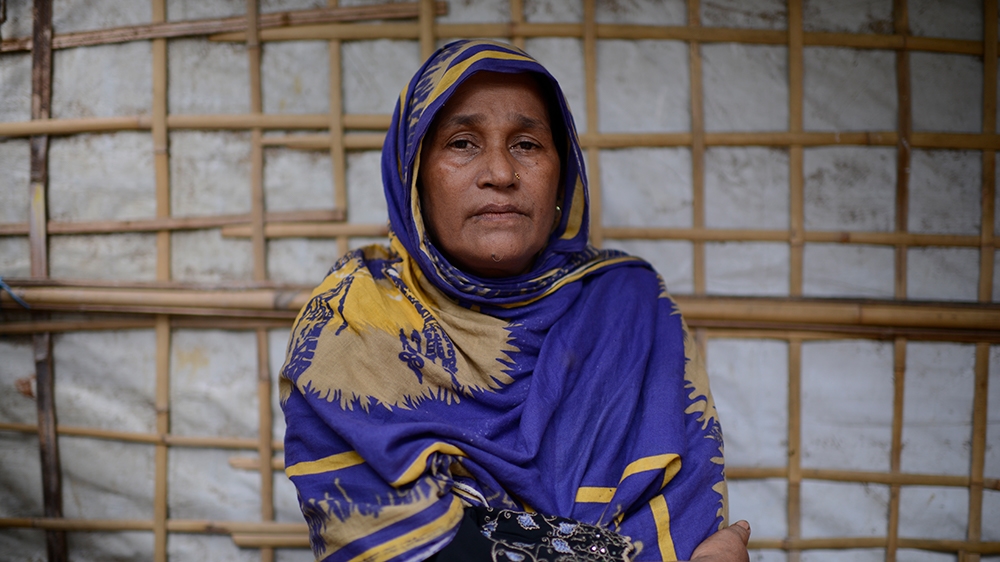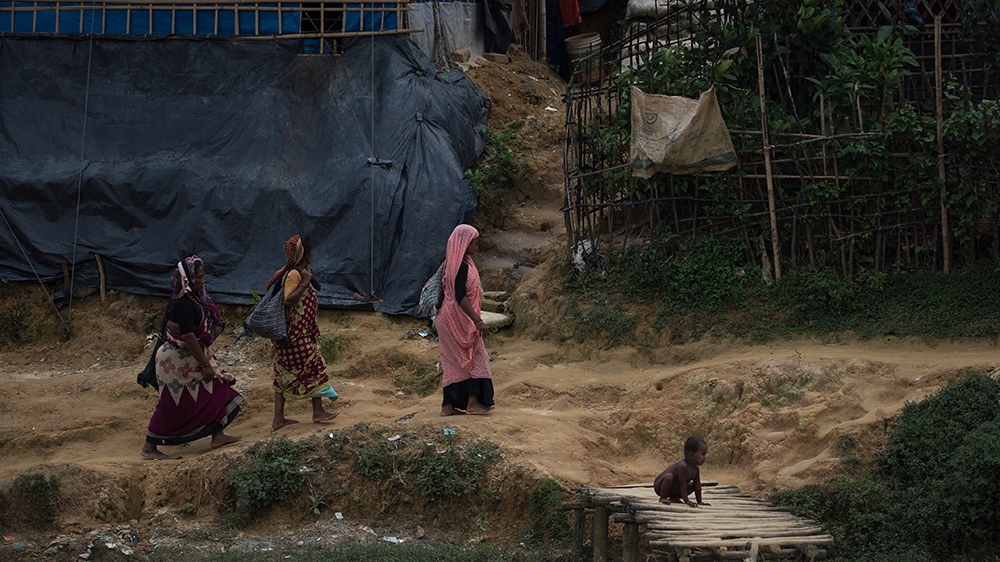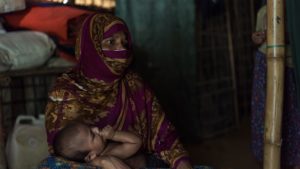Aljazeera – In a community that considers victims of sexual violence a disgrace, women are left alone to suffer.
Cox’s Bazar, Bangladesh – Last year’s Eid al-Adha holiday is a nightmarish memory Fatima wishes she could block forever.
Instead, she is forced to live with the horror and shame every time she recalls what happened.
Fatima, whose real name was changed to protect her privacy, is a widow and mother of five girls. She fled her village of Merula, in Myanmar’s Rakhine state, as a government-backed attack on the minority Rohingya population escalated, in what the United Nations described as “textbook ethnic cleansing”.
Fatima’s daughters crossed into Bangladesh before her, as it is the custom for Rohingya women to send their children ahead with the village men making their way to the border. As the violence spiralled into chaos, she decided to leave.
In August last year, she reached Daungkhali Char, an island in Myanmar across the Naf River from Bangladesh, before her luck ran out.
She said two Myanmar soldiers dragged her away to a field and for the next two days raped her repeatedly, sometimes to the point where she lost consciousness.
“I don’t know how many times they violated my body,” Fatima said in a voice barely above a murmur.
When the soldiers decided to move on, she crossed the Naf River into Bangladesh, numb to the bone and dazed out of her mind.
“I was unaware of my senses for a while,” she said. “I found out five months later I was pregnant. I tried to have an abortion by swallowing pills, but that didn’t work.”
She looked down at the baby nestled in the crook of her arm. “I didn’t tell anyone he was conceived through rape.”
Four-month-old Bilal fussed and started wailing. Distractedly, Fatima rubbed his back in circular motions until he fell quiet again.
 |
| Fatima spends her days under her dim tarp-and-bamboo shelter, afraid of being judged [Sorin Furcoi/Al Jazeera] |
Shunned and brokenhearted
Fatima now lives with four of her daughters in Balukhali camp, part of the severely overcrowded Kutapalong camp that now houses more than 600,000 refugees. She spends her days under her dim tarp-and-bamboo shelter, afraid of being judged if she ventures outside, even if it is to get provisions handed out by humanitarian organisations.
She relies instead on the kindness of her neighbour Shamim who, along with his wife, know her secret and deliver aid provisions to her shelter.
Refugees living in the same section of the camp are mostly from other villages and don’t know her backstory, such as the fact her husband died five years ago from illness.
“Many assume that my husband was killed by the Myanmar army while I was pregnant with Bilal,” Fatima said. “But those who know me shun me, which causes me so much grief.”
Her voice breaks and rises to choke back a sob.
“My eldest daughter is married and lives in another camp, and her husband forbade her from visiting me,” she said, her eyes bright with tears. “I haven’t seen her for almost a year.”
She delivered Bilal at a hospital clinic run by Doctors Without Borders (MSF). No questions were asked about how the baby was conceived, and Fatima remained silent, too ashamed to offer the truth.
“After I gave birth, MSF gave me a pair of sandals, a headscarf, and baby food,” she said. “I have to visit the clinic once a week to get tablets that help me develop breast milk.”
She hasn’t received any kind of psychological help and, fearing social stigmatisation, admits she won’t be able to tell the truth about Bilal at counselling centres and women-friendly spaces set up in the camp, much less to her new neighbours.
The idea frightens her to the point where she starts crying again.
 |
| Abdulmunam, a Rohingya community leader [Sorin Furcoi/Al Jazeera] |
Smear of stigma
A Rohingya community leader in Fatima’s camp, Abdulmunam, is familiar with her story and said it is his job to know the needs of the 84 families in the block. Yet he acknowledged the reaction to breaking down socially ingrained concepts, and said openly speaking about sexual violence would result in a backlash and be counterintuitive.
“Everyone here should assist and support each other as much as possible, given our helpless situation,” he said.
“But our community regards rape survivors as a disgrace so it’s easier for me to tell some NGOs and aid agencies, instead of fellow refugees, about Fatima’s case in order to help her out and send her provisions.”
Johara Khatun, 50, is known in the neighbouring Kutapalong camp as one of the best midwives, but in the 10 months since she fled Rakhine she has not come across any women who told her they were raped.
“Rape is the worst kind of torture for women, especially if it results in conception,” she said.
“But they should keep quiet and not talk about what happened to them, otherwise people would regard them as tarnished, and cut off their ties with them. In the case of unmarried girls, no one would look at them or consider them for marriage.”
 |
| ‘Rape is the worst kind of torture for women,’ says Johara Khatun [Mahmud Hossain Opu/Al Jazeera] |
Johara said she doesn’t think abortion is the solution but concedes that it could be “maybe only” in the early stages of pregnancy.
“It is better to have the baby and if the women still don’t want to take care of it they can give the baby to families who want children,” she said.
Tayabur Rahman Chowdhury, head of UNHCR’s health units in Kutapalong camp, said the refugee agency has recruited community health volunteers from the refugees themselves in a bid to break down these social attitudes.
“We try to take big initiatives whenever we hear that social stigma has begun to take root against an unmarried girl or mother,” he said, sitting in his office near the entrance of the camp.
“We confront the community and ask, ‘how is this their fault? What would you do in her position?’ She was forced, she was raped, and it’s not her fault.”
Attitudes towards sexual violence victims have not dramatically changed to absolve the victims of any blame, but Chowdhury said these things take time and more awareness-building.
 |
| Tayabur Rahman Chowdhury [Sorin Furcoi/Al Jazeera] |
‘Calculated’ use of rape
Aid agencies, which have treated hundreds of Rohingya women subjected to gender-based violence in Rakhine state since August 2017, say estimates of the number of raped women are greatly understated because reluctance and shame prevent them from coming forward.
In a report published in March, MSF said it had treated 113 survivors of sexual violence since August 25 last year, ranging in age from nine to 50 years old.
Based on testimonies, the organisation said Myanmar soldiers deliberately used rape and other forms of sexual violence against women and girls as part of a widespread attack against the Rohingya population.
In April, UN Secretary-General Antonio Guterres placed Myanmar’s army on a watchlist report of security forces and armed groups “credibly suspected” of using rape and sexual violence in conflict.
“The widespread threat and use of sexual violence was integral to this strategy, serving to humiliate, terrorise and collectively punish the Rohingya community as a calculated tool to force them to flee their homelands and prevent their return,” Guterres said.
 |
| Women in Kutapalong refugee camp [Sorin Furcoi/Al Jazeera] |
Physical evidence impossible
Chowdhury said since last October, a handful of women have come to his health centre in Kutapalong camp saying they had been raped.
“Some of them arrived at the centre after they missed their periods and told me what Myanmar soldiers and Rakhine vigilantes did to them,” he said. “Two other women came to me to get abortions, which the centre provides.”
He explained that for official records, it was difficult to document physical evidence of rape after the first 72 hours as abrasions, cuts, and bruises usually go away after that time.
“For unmarried girls, hymens are no marker of whether rape occurred or not because not all women have hymens,” he said.
“This leaves us with the option of asking rape survivors to keep the clothes they were wearing during the incident unwashed, and to not clean their bodies until they reach the health centre so we can run tests.”
But that is also not realistic, he said, as the women inevitably wash after days of travelling on foot crossing the border.
For those shouldering the secret of birthing a child conceived by rape, dealing with the trauma and the aftermath is dependent on support from family members.
For Fatima, she has come to love her baby – as have her daughters living with her – and said she would not give him away.
“I don’t even know which one of the soldiers that raped me is the father of Bilal,” she said. “But he is my child, and my only son.”


